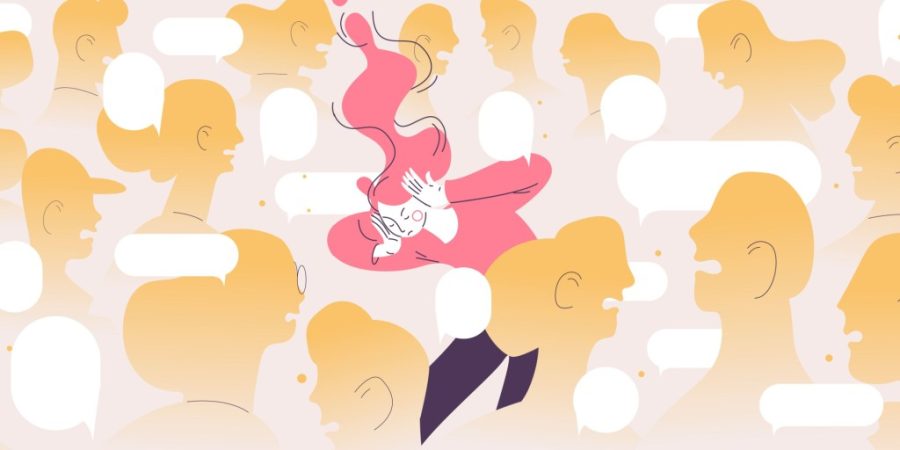
From Springbrook Hospital –
Many people experience anxiety before speaking to a crowd, taking a test, or going in for a job interview. However, others experience severe, persisting anxiety that influences their everyday lives. If it never seems to go away, those people start asking questions. They want to know: Can anxiety be cured, or will it control their lives forever?
Fortunately, there are ways to prevent anxiety from running someone’s life. Like many other medical conditions, resources to limit its overall influence exist. As for whether anxiety can be cured, the answer becomes slightly more complicated, as we’ll discuss later on.
Table of Contents
Types of Anxiety Disorders
Before we answer the question, “Can anxiety be cured?” it is important to recognize that anxiety itself is a varied and complex condition. Sometimes, anxiety is not its own disorder, but a symptom of another health issue. In those cases, addressing the underlying condition responsible for someone’s anxiety may eliminate their symptoms.


If someone’s anxiety persists by itself for weeks a time, however, they may have an anxiety disorder. According to the Diagnostic and Statistical Manual of Mental Disorders, Fifth Edition (DSM-5), as prepared by the American Psychiatric Association, common types of anxiety disorders include:
- Generalized anxiety disorder (GAD)
- Social anxiety
- Separation anxiety
- Panic disorder (recurring panic attacks)
- Obsessive-compulsive disorder (OCD)
- Selective mutism
- Specific phobias
Generally, if someone asks, “Can anxiety be cured?” they are most likely referring to one of the above disorders. Each brings its own trials, diagnostic criteria, and treatment requirements, but they often share certain key traits. Namely, many anxiety disorders benefit from similar types of therapy and other treatments. This makes it possible to discuss their treatment outlooks in a somewhat generalized setting.
However, keep in mind that they are all still different disorders. Depending on the type of anxiety you live with, you may have a different experience trying to get treatment. With that said, let’s address the big question: Can anxiety be cured?
Can Anxiety Be Cured?
The short answer to, “Can anxiety be cured?” is no, but only in the sense that someone cannot permanently guarantee they will never have another anxiety or panic attack. With proper treatment, they can greatly reduce their symptoms. They may even feel as though they are cured if enough time passes without a resurgence of their symptoms. However, the reality remains that “cure” would be a misleading term to use.
Compare anxiety to a condition like chronic headaches. With the right precautions, medications, and other treatment methods in place, someone can find relief from a headache. Weeks or even months could pass before they experience another one. Even so, they are not “cured,” as there is always a chance that they will have another headache.
Anxiety disorders work in a similar way. While the risk of experiencing anxiety cannot be eliminated entirely, it is still worthwhile to seek treatment. Treatments for anxiety disorders can help lessen the severity of individual episodes as well as increase the time between them. Overall, this means that anxiety affects someone’s life less, and it allows them to reclaim a sense of normal, daily living.
So, even though the technical answer to, “Can anxiety be cured?” is no, that does not mean anxiety will always control someone’s life. By utilizing effective treatments for anxiety disorders, they can regain that control and find long-term relief from anxiety.
Treating Anxiety Disorders
Now that you understand some of the complexities of a question like, “Can anxiety be cured?” we can reframe the question in another way, such as, “How is anxiety treated?”
Numerous methods of treating anxiety disorders exist. Furthermore, some types of treatments will be more effective for certain people than others. It depends on factors such as the severity of their symptoms and what type of anxiety disorder they have.
In many cases, individuals with anxiety benefit from more than one of the following. Implementing a combination of treatment options increases the likelihood of successfully reducing anxiety, even though it cannot be cured in full.
Therapy for Anxiety
One of the most prominent methods of treating anxiety disorders comes in the form of different therapies, of which there are many. For example, two common styles used to treat anxiety disorders include cognitive behavioral therapy (CBT) and exposure therapy.
CBT is based on the idea that thoughts, feelings, and behaviors are all interconnected. By identifying and changing behaviors that feed into specific, negative thoughts, someone can affect the way they think about themself and the world. Since anxiety is often tied to specific fears and worries, disproving those thoughts through the use of tangible behaviors can help a person overcome them.
Alternatively, exposure therapy takes an even more direct approach to anxiety treatment. Though the answer to, “Can anxiety be cured?” remains no, exposure therapy can have a major impact on the prevalence of someone’s symptoms, especially in the case of specific phobias.
Exposure therapy gradually introduces someone to the source of their anxiety in small, manageable steps. As they become more used to facing their fear, they learn that it poses no genuine threat to them.
CBT and exposure therapy are only two of many types of therapy used to treat anxiety disorders. Even if neither ends up working well for you, you can try many others until you find one that relieves your symptoms.
Anti-Anxiety Medications


Some people who ask, “Can anxiety be cured?” hope or expect to find an instant, all-encompassing solution in the form of a pill. While anti-anxiety medications do exist and have proven to be very effective at reducing anxiety, they—like all other anxiety treatments—cannot fully “cure” someone of their disorder.
Instead, anxiety medications tend to help combat acute episodes of anxiety. Many are designed to be taken on a short-term, as-needed basis, so as to prevent individuals from growing dependent on them.
Consider the comparison to chronic headaches from before. Short-acting anxiety medications work similarly to headache medications, in that someone takes them when they expect or encounter symptoms. In that way, anxiety and panic attacks can be effectively fended off, similarly to headaches and migraines.
The National Library of Medicine reports the following anti-anxiety medications as some of the most common:
- Benzodiazepines
- Selective serotonin reuptake inhibitors (SSRIs)
- Serotonin and norepinephrine reuptake inhibitors (SNRIs)
- Tricyclic antidepressants
It may take a period of trial-and-error to discover which medication works best for someone. Oftentimes, it is not the first medication they try, and it may not even be the second, especially if they expect the answer to, “Can anxiety be cured by medication?” to be yes. With patience and an open mind, however, they can find the option that best suits their needs.
Support Groups
The final treatment option we will discuss today is somewhat unlike the other two. Before (or after) reaching out to a professional for help, someone can give their recovery chances a boost simply by evaluating the environment closest to them. If they find a group of encouraging, supportive people, they may find their symptoms easier to cope with.
Friends and family cannot provide medical advice or fill the role of healthcare professionals. However, they can educate themselves on anxiety and how to help those who live with it. This may look like watching out for anxiety triggers, helping someone calm down from a panic attack, or being there to talk them through a spiraling thought process.
That being said, support groups should not be the only source of help someone receives. Just as anxiety cannot be cured by therapy or medications, supportive words and actions cannot completely relieve someone of their symptoms, either. Instead, support groups provide a foundational level of encouragement that makes it more likely for other treatments to succeed.
Anxiety Disorder Treatment in Brooksville, Florida
Even though the technical answer to, “Can anxiety be cured?” is no, that does not mean it cannot be managed successfully. Finding the right treatment facility is a crucial step in learning how to minimize the influence of anxiety.
Springbrook Behavioral Hospital is a mental health treatment center in Brooksville, Florida that treats anxiety disorder in adults. We utilize evidence-based therapies and other treatment modalities to teach our patients the healthy coping skills they need to overcome anxiety.
While in our care, you will work with a team of mental health professionals to develop an individualized treatment plan. We offer flexible recovery plans to ensure each patient receives the care they need. Our programs include an intensive treatment program as well as a partial hospitalization program (PHP) for those with less severe symptoms.
If you would like to learn more about treatments for anxiety disorders, please call us at 352-600-3288 or submit a confidential contact form. Our admissions experts will gladly answer any questions you have, whether they are about our services or about anxiety at large, such as, “Can anxiety be cured?”
The fight against anxiety can feel all-consuming. Fortunately, it doesn’t have to be. With the support and resources provided by Springbrook Behavioral Hospital, you can find relief from anxiety and thrive in day-to-day life.
The post Can Anxiety Be Cured? How to Reduce Symptoms appeared first on Springbrook Hospital.
Source
Original Author: Springbook Hospital

